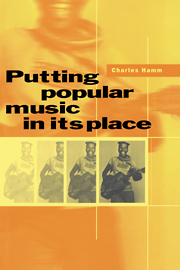Book contents
- Frontmatter
- Contents
- Acknowledgements
- Preface
- 1 Modernist narratives and popular music
- 2 Rock and the facts of life
- 3 Changing patterns in society and music: the US since World War II
- 4 “If I Were a Voice”: or, The Hutchinson Family and popular song as political and social protest
- 5 Some thoughts on the measurement of popularity in music
- 6 Elvis, a review
- 7 Home cooking and American soul in black South African popular music
- 8 Rock ‘n’ roll in a very strange society
- 9 African-American music, South Africa, and apartheid
- 10 “The constant companion of man”: Separate Development, Radio Bantu, and music
- 11 Privileging the moment of reception: music and radio in South Africa
- 12 Music and radio in the People's Republic of China
- 13 Towards a new reading of Gershwin
- 14 A blues for the ages
- 15 Graceland revisited
- 16 Dvořák in America: nationalism, racism, and national race
- 17 The last minstrel show?
- 18 The Role of Rock, a review
- 19 Genre, performance, and ideology in the early songs of Irving Berlin
- 20 Epilogue: John Cage revisited
- Index
16 - Dvořák in America: nationalism, racism, and national race
Published online by Cambridge University Press: 05 February 2012
- Frontmatter
- Contents
- Acknowledgements
- Preface
- 1 Modernist narratives and popular music
- 2 Rock and the facts of life
- 3 Changing patterns in society and music: the US since World War II
- 4 “If I Were a Voice”: or, The Hutchinson Family and popular song as political and social protest
- 5 Some thoughts on the measurement of popularity in music
- 6 Elvis, a review
- 7 Home cooking and American soul in black South African popular music
- 8 Rock ‘n’ roll in a very strange society
- 9 African-American music, South Africa, and apartheid
- 10 “The constant companion of man”: Separate Development, Radio Bantu, and music
- 11 Privileging the moment of reception: music and radio in South Africa
- 12 Music and radio in the People's Republic of China
- 13 Towards a new reading of Gershwin
- 14 A blues for the ages
- 15 Graceland revisited
- 16 Dvořák in America: nationalism, racism, and national race
- 17 The last minstrel show?
- 18 The Role of Rock, a review
- 19 Genre, performance, and ideology in the early songs of Irving Berlin
- 20 Epilogue: John Cage revisited
- Index
Summary
This essay originated as a paper delivered at the Dvořák Sesquicentennial Conference and Festival held in New Orleans on 14–20 February 1991. Most of the participants were historical musicologists from the United States and what was then Czechoslovakia. The notion that Dvořák drew on American “folk” material in several of his extended pieces written in America and had urged American composers to do the same, first put forward by journalists in the last decade of the nineteenth century, is still widely accepted, though the nature and source of this “folk” material and the meaning of the term “folk” at that time are not questioned. As a result, Dvořák's knowledge of and admiration for the plantation songs of Stephen Foster and other American songwriters has been overlooked, as has the complex interaction at the turn of the century among several genres – classical music, “national song,” popular music – and the ideology embedded in these genres and their labels.
Style is ultimately national.
Hubert Parry,
inaugural address to the Folk Song Society of England, 1898
Nationalism in music is defined by The New Harvard Dictionary of Music as:
the use in art music of materials that are identifiably national … in character. These may include actual folk music, melodies or rhythms that merely recall folk music, and nonmusical programmatic elements drawn from national folklore, myth, or literature. […]
- Type
- Chapter
- Information
- Putting Popular Music in its Place , pp. 344 - 353Publisher: Cambridge University PressPrint publication year: 1995

